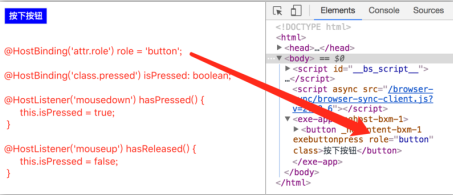原文
https://www.jianshu.com/p/20c2d60802f7
大纲
1、宿主元素(Host Element)
2、HostListener
3、HostListenerDecorator 装饰器应用
4、HostBinding
5、HostBinding 装饰器应用
宿主元素(Host Element)
在介绍 HostListener 和 HostBinding 属性装饰器之前,我们先来了解一下 host element (宿主元素)。
宿主元素的概念同时适用于指令和组件。对于指令来说,这个概念是相当简单的。应用指令的元素,就是宿主元素。假设我们已声明了一个 HighlightDirective 指令 (selector: '[exeHighlight]'):
<p exeHighlight> <span>高亮的文本</span> </p>
上面 html 代码中,p 元素就是宿主元素。如果该指令应用于自定义组件中如:
<exe-counter exeHighlight>
<span>高亮的文本</span>
</exe-counter>
此时 exe-counter 自定义元素,就是宿主元素。
HostListener
HostListener 是属性装饰器,用来为宿主元素添加事件监听。
/*
HostListenerDecorator 装饰器定义
*/
export interface HostListenerDecorator {
(eventName: string, args?: string[]): any;
new (eventName: string, args?: string[]): any;
}
HostListenerDecorator 装饰器应用
/*
counting.directive.ts
*/
import { Directive, HostListener } from '@angular/core';
@Directive({
selector: 'button[counting]'
})
class CountClicks {
numberOfClicks = 0;
@HostListener('click', ['$event.target'])
onClick(btn: HTMLElement) {
console.log('button', btn, 'number of clicks:', this.numberOfClicks++);
}
}
/*
app.component.ts
*/
import { Component} from '@angular/core';
@Component({
selector: 'exe-app',
styles: [`
button {
background: blue;
color: white;
border: 1px solid #eee;
}
`],
template: `
<button counting>增加点击次数</button>
`
})
export class AppComponent {}
/*
以上代码运行后浏览器显示的结果:
*/

此外,我们也可以监听宿主元素外,其它对象产生的事件,如 window 或 document 对象。具体示例如下:
/*
highlight.directive.ts
*/
import { Directive, HostListener, ElementRef, Renderer } from '@angular/core';
@Directive({
selector: '[exeHighlight]'
})
export class ExeHighlight {
constructor(private el: ElementRef, private renderer: Renderer) { }
@HostListener('document:click', ['$event'])
onClick(btn: Event) {
if (this.el.nativeElement.contains(event.target)) {
this.highlight('yellow');
} else {
this.highlight(null);
}
}
highlight(color: string) {
this.renderer.setElementStyle(this.el.nativeElement, 'backgroundColor', color);
}
}
/*
app.component.ts
*/
import { Component} from '@angular/core';
@Component({
selector: 'exe-app',
template: `
<h4 exeHighlight>点击该区域,元素会被高亮。点击其它区域,元素会取消高亮</h4>
`
})
export class AppComponent {}
/*
以上代码运行后浏览器显示的结果:
*/

我们也可以在指令的 metadata 信息中,设定宿主元素的事件监听信息,具体示例如下:
/*
counting.directive.ts
*/
import { Directive } from '@angular/core';
@Directive({
selector: 'button[counting]',
host: {
'(click)': 'onClick($event.target)'
}
})
export class CountClicks {
numberOfClicks = 0;
onClick(btn: HTMLElement) {
console.log('button', btn, 'number of clicks:', this.numberOfClicks++);
}
}
HostBinding
HostBinding 是属性装饰器,用来动态设置宿主元素的属性值。
/*
HostBinding 装饰器定义
*/
export interface HostBindingDecorator {
(hostPropertyName?: string): any;
new (hostPropertyName?: string): any;
}
HostBinding 装饰器应用
/*
button-press.directive.ts
*/
import { Directive, HostBinding, HostListener } from '@angular/core';
@Directive({
selector: '[exeButtonPress]'
})
export class ExeButtonPress {
@HostBinding('attr.role') role = 'button';
@HostBinding('class.pressed') isPressed: boolean;
@HostListener('mousedown') hasPressed() {
this.isPressed = true;
}
@HostListener('mouseup') hasReleased() {
this.isPressed = false;
}
}
/*
app.component.ts
*/
import { Component } from '@angular/core';
@Component({
selector: 'exe-app',
styles: [`
button {
background: blue;
color: white;
border: 1px solid #eee;
}
button.pressed {
background: red;
}
`],
template: `
<button exeButtonPress>按下按钮</button>
`
})
export class AppComponent { }
/*
以上代码运行后浏览器显示的结果:
*/


Host Property Bindings
我们也可以在指令的 metadata 信息中,设定宿主元素的属性绑定信息,具体示例如下:
/*
button-press.directive.ts
*/
import { Directive, HostListener } from '@angular/core';
@Directive({
selector: '[exeButtonPress]',
host: {
'role': 'button',
'[class.pressed]': 'isPressed'
}
})
export class ExeButtonPress {
isPressed: boolean;
@HostListener('mousedown') hasPressed() {
this.isPressed = true;
}
@HostListener('mouseup') hasReleased() {
this.isPressed = false;
}
}
宿主元素属性和事件绑定风格指南
优先使用 @HostListener 和 @HostBinding ,而不是 @Directive 和 @Component 装饰器的 host 属性。
对于关联到 @HostBinding 的属性或关联到 @HostListener 的方法,要修改时,只需在指令类中的一个地方修改。 如果使用元数据属性 host,你就得在组件类中修改属性声明的同时修改相关的元数据。